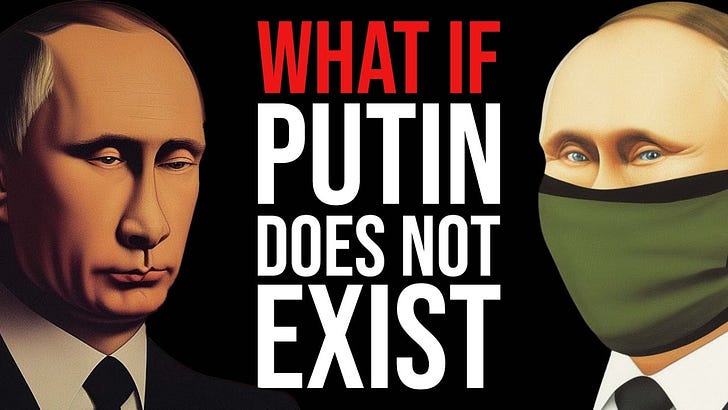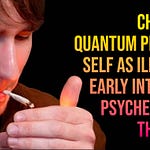On January 19, Ukraine’s President Vladimir Zelensky said this about negotiations with Putin: “Today, I don't quite understand who it is I should be talking to and about what. I'm not sure the Russian President that we sometimes see in front of a green screen is really him. I'm not sure he's alive, whether it's he who is making decisions, or somebody else. I don't have this information.”
Ukraine’s chief of intelligence, Major General Budanov made more extensive remarks on this in 2022. “The Putin they used to show from 1999 to 2010—though sometimes body doubles were used then too—that person is definitely different from the person we see now. They have different habits, mannerisms, gait; sometimes, even different height, if you look close enough. The shapes of the ears are different—and that’s like a fingerprint, every person has their own ear shape. Who plays the role of Putin today is absolutely an open question. It’s a ‘Collective Putin,’ that’s most appropriate way to say it.”
I have brought up this idea of Putin not being real, which has been around for at least a dozen of years, numerous times here in Psychopolitica (1, 2, 3). In this episode, I discuss it again with my friend, science writer and fellow psychonaut John Horgan. We also talk about censorship in ChatGPT and the dark desires of Microsoft’s new chat bot (as reported by the New York Times).
“What I'm struggling with, as I've been struggling with over the years, is formulating my own understanding of why this idea is important.
I feel there is something about it. Just the fact that it's so persistent and it has so many different shapes and it pops up in different places suggests to me that it articulates something important about either the Russian reality, or the nature of power, or politics, or something else. It might be a deeply held belief that is hard to put in words, it might be a truth, it might be an intuition, a suspicion about how the world works. Sure, it is trippy and weird and interesting, but what I want to do is to come up with some interpretations for it that would actually be useful, that could give some kind of an actionable insight, one that can inform one's relationships with these realities.
I've written out a few approaches to this, my favorite of which could be called psychological. I don't know if I believe it, or... You know, it's what I'm thinking about. And the way I'm thinking about it is:
Putin is this faceless man—his nickname in the KGB was The Moth—and the narrative goes, he was put into power by the oligarchs of the 1990s, who thought they could control him, who thought he's just a functionary. They needed somebody reliable, and this guy seemed to fit the bill. It didn't quite work out: some of these oligarchs are dead, some were jailed and then exiled...
The way I'm thinking about it is he might be—whether it's his conscious strategy, or it just so happened that he navigates the world this way—but he allows people to project a whole lot on him. Different people see different things when they look at Putin.
And the Russian people at the end of the nineties, when he came to power—and still now, I think—were, broadly speaking, a deeply traumatized bunch who didn’t feel a sense of agency in their own lives, either on the individual level or on the political one.
Like, the Soviet Union was dissolved in 1991. This was a decision made by three men, the presidents of Russia, Ukraine, and Belarus. The same year, a few months prior, there was a referendum held in the Soviet Union. Not every republic took part—I think it was nine that did. And the results were that 70 something percent voted for the preservation of the Soviet Union—there was some formulation, "the preservation of the USSR as a renewed union (or federation, or something) of independent states where human rights are gonna be protected and whatnot." But the question was: Do we preserve the union or not? And overwhelmingly, the people who took part in the vote said yes.
And then a few months later, after a failed coup attempt, there was what I see as a successful coup by Yeltsin. He and the other heads of Soviet republics got power for themselves. If there is no Soviet Union, then they are leaders of independent states as opposed to regional leaders within a larger country.
So that's an example: people did go to the polls to exert their political will, and then, a few months later, they were told that their vote didn't count. They were not the ones who had agency.
I just finished watching this series by Adam Curtis that came out last year, called TraumaZone. He works with the BBC archives—there are these vast archives of footage from Russia and the Soviet Union filmed by the BBC crews—and he just documents what the country had gone through from 1985 to 1999, when Putin came to power. He shows the system completely collapsing in all of these different areas, and the population going through extreme poverty, extreme corruption, and, again, a sense of a lack of agency. You're just thrown in different situations by these big historical forces. And I know it from personal experience with people from that generation: a lot of them didn't feel they were defining their reality, at all. They were just thrown about by time they were living through.
So this is my psychological interpretation of the "Putin does not exist" or "Putin is fake" idea: the people who had no sense of agency in their own lives sort of collectively hallucinated this person who had all the agency in the world. He's the powerful guy. He's the top dog. And he allowed them to project all this power onto him.
And then he became this runaway hallucination. It's like in Fight Club: the Narrator unconsciously invents this Tyler Durden character, this assertive macho guy, and outsources all the decision making power to him.
And then the question that I don’t have an answer to is: If you entertain the idea in this way, what do you then do with it? How do you restore the people's sense of agency? How do you integrate this hallucination into the collective psyche and get to a place where the people do decide their own fate and take responsibility for it, instead of submitting their will to this weird character?..”















Share this post